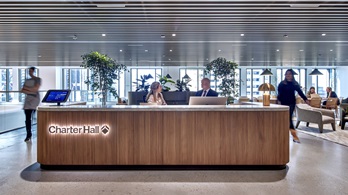Ten reasons why the office is still the best place to work
By proceeding you confirm that you are a resident of Australia or New Zealand accessing this website from within Australia or New Zealand and you represent, warrant and agree that:
- you are not in the United States or a “U.S. person”, as defined in Regulation S under the U.S. Securities Act of 1933, as amended (“U.S. Person”), nor are you acting for the account or benefit of a U.S. Person;
- you will not make a copy of the documents on this website available to, or distribute a copy of such documents to, or for the account or benefit of, any U.S. Person or any person in any other place in which, or to any other person to whom, it would be unlawful to do so; and
- the state, territory or province and postcode provided by you below for your primary residence in Australia or New Zealand are true and accurate.
Unfortunately, legal restrictions prevent us from allowing you access to this website. If you have any questions, please contact us by e-mail by clicking on the link below.
The reasons why offices were the best place to work before the pandemic remain the same now. It’s time to bring people back, says Charter Hall’s Adrian Taylor.
Taylor, Charter Hall’s Office CEO, says retailers are re-opening, school is in session, restaurants, pubs and clubs are back on the social agenda and suburbs are a hive of activity, but our CBDs remain quiet.
The “increasingly small number of inhibitors – transport and schooling being the largest – have helped us make significant strides to normality”. Our communities are “well-conditioned” to new social distancing and hygiene standards, and office building owners and managers have “done a great job” of preparing.
So, what are we waiting for?
“I think there’s an overdone perception that people will experience congestion, there will be challenges with lifts and waiting times, and that the experience will be difficult and unpleasant. But I’ve been back in our office nearly a month and it’s been exactly the opposite – it’s been a breeze,” Taylor explains.
Charter Hall’s recent survey of its tenant customers revealed that “upwards of 70 per cent are looking forward to coming back to the office in the short term” – with most of them planning to return “on a measured and considered basis” over June and July. Tenant customers who have taken the lead have been “pleasantly surprised”.
Taylor acknowledges that not everyone is ready to return, and that organisations should prepare their office appropriately and support those who have health concerns. But for everyone else “there are very sound reasons why we all come together in a common physical place”.
“The steady shift towards more agile, flexible workspaces – where there’s less space for individuals and more space for collaboration – has occurred precisely because organisations recognise they thrive in those environments.”
So why is the office still the best place to work? Taylor has 10 reasons:
- Collaboration: The great work-from-home experiment has proven we can work remotely. “But you don’t get ‘serendipitous bump moments’. It’s really hard to have a quick conversation or float a new idea when you’re stuck on Zoom calls all day. In the office, people bump into each other, and the magic can happen” Taylor says.
- Social interaction: The office is a social outlet for many people – especially when one in three Australians experience social isolation. Colleagues can often become our second family and 16 per cent of people meet their life partner at work. “The office and our CBDs are a melting pot of meeting places,” Taylor says.
- Growth: “We’ve proved we can maintain our businesses remotely, but I’d contend that few can really successfully grow a business without having their teams together,” Taylor says. “How many people are meeting new people virtually or creating new business opportunities? It can be done, but I guarantee it can’t be done at the same rate.”
- Culture: Leaders understand workplace culture isn’t about individual performances, personalities or attitude – it’s about how the team works together as a cohesive unit, “and this is hard to create virtually – especially when you are building a new business or going through a period of growth.”
- Security: Remote work settings may pose threats to intellectual property and other proprietary information or technology. The Australian Cyber Security Centre has reported an increase in COVID-19 themed malicious cyber activity, for example. While encryption tools and IT security protocols can help, “there’s always a greater risk that, when someone is working from the kitchen bench in a share home or joining virtual meetings from a café, an organisation’s data, ideas and trade secrets are at risk”.
- Innovation: “Thoughts can occur anywhere and in any environment, but offices bring out the best innovating and ideating. The energy and buzz that comes from being in the same physical space is hard to replicate virtually,” Taylor says.
- Building new relationships: It’s easy to fall back to trusted relationships in tough times, but how do you build new ones in a remote world? The very simple human act of having in-person conversations gives us valuable verbal and visual cues.
- Learning and mentoring: Taylor points to the 70:20:10 model for learning and development. Ten per cent of our learning comes from formal education, 20 per cent from working with others and 70 per cent from osmosis learning and on-the-job experiences. “Learning to read body language, listening in on conversations to gain insight into how people negotiate… these are skills we learn from others. How do you learn to develop those skills remotely?”
- A structured day: “It may sound boring but many of us work better with routines and the office is the best environment to support that. A lot of us have complained about the ‘never ending day’ when we worked from home – starting early and working late – but the office isn’t just a place that separates home and work life. For some people, particularly people who have been victims of domestic violence, the office is a safe haven.”
- Equality of space: There's nothing like the comforts of home - except when you're working huddled over a screen, sitting on an uncomfortable chair or straining your eyes in poor lighting. Ergonomics matter. “The workplace provides a level playing field and an equality of space,” Taylor adds.
Flexible working is important and we’ve seen that businesses can function remotely. But don’t lose sight of all the glue and the oil that a modern office provides. If you want your organisation to thrive and grow, don’t overlook the role of your office,” Taylor concludes.


